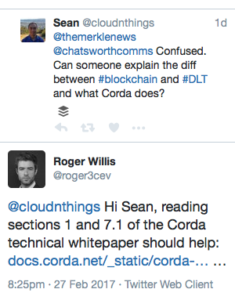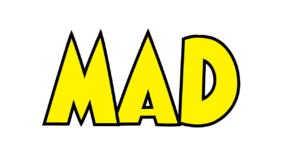
There has been a recent activity around an article published with the title of “R3 Appears to Admit Defeat, Stops Blockchain Development“. The argument goes like this. On one hand, R3 claim they never were in the blockchain space. They claim they were in the distributed ledger space. On the other hand, others claim that R3 were in the blockchain space in order to get the investment required and then pivoted.
Saifedean Ammous (@saifedean) has been the most vocal …
Blockchain is what you say when you want funding. DLT & Corda is for when you've not delivered shit but want to pretend you're working hard. https://t.co/2x7UrDlrmw
— Saifedean Ammous (@saifedean) February 27, 2017
But it got me thinking. What is the difference between a distributed ledger technology and blockchain technology?

Roger Willis (from R3) pointed me to the technical whitepaper. 56 pages written by Mike Hearn on 29th November 2016 called “Corda: A distributed ledger”. For those of you who don’t know, Mike left the bitcoin community and joined R3 and there’s a whole back story to that as well that I’m sure readers can Google themselves.
Back to the technology. The whitepaper is very well written, very readable (I’ve read a fair few!) and I think I understand what Corda is.
In a sentence, I think Corda is a “private, peer to peer, distributed ledger focused for the financial sector”. Here is why:
- It is private because (pg 7):
Corda is designed for semi-private networks in which admission requires obtaining an identity signed by a root authority.
- A distributed ledger can be thought of as a database. In fact, on page 4 of the white paper
Corda is a decentralised database platform
- It works with legacy systems prevalent in the financial sector:
Corda reuses the standard PKIX infrastructure
Nodes are backed by a relational database and data placed in the ledger can be queried using SQL as well as joined with private tables
Nodes, communicating using AMQP/1.0 over TLS. Nodes use a relational database for data storage.
Corda follows a general philosophy of reusing existing proven software systems and infrastructure where possible. (pg 5)
- The killer sentence though:
Issuance transactions may append new states to the database without consuming any existing states but unlike in Bitcoin these transactions are not special and may be created at any time, by anyone. (pg 6)
If I understand this correctly, in bitcoin for example, the money supply is fixed. 21 million. In Corda, issuance transactions (ie money is one example) maybe created at any time, by anyone.
Other considerations:
- Corda doesn’t use the concept of miners running Proof of Work algorithms to achieve consensus. It relies on “pluggable notaries”.
Being able to support multiple notaries in the same network has other advantages (pg 31)
- Corda doesn’t propagate all the messages to every participant in the network. It’s on a need to know basis.
- The concept of flow hospital sounds a bit cheesy.
The video below “Richard Gendal Brown & Mike Hearn: Corda – A Distributed Ledger For Financial Services” explains notaries in more detail at 54:13 and also talks about manual interaction in the workflow at 1:01:00.
It is a great video explaining what Corda does.
This blog here from Richard (https://gendal.me/2016/04/05/introducing-r3-corda-a-distributed-ledger-designed-for-financial-services/) (Richard writes very well by the way) attempts to define the make up or attributes of a blockchain and how Corda picks from this “Blockchain Bundle” menu what it needs, what it doesn’t need and what it needs to tweak in order to build Corda.
Summary
Corda have done a great job getting the banks together and presenting a technology offering comprising of the new, mixed with the old. The new would never work though because it cuts the banks out of the loop. That was why bitcoin was invented in the first place!
I’ll leave it up to the reader to decide where Corda fits in the big picture but spare this thought. The current financial system is poisonous. It’s a big wheel that churns, crushing the unfortunate in it’s path and rewarding those who may not deserve it. It is propelled by greed, power and control.
The only way to change this, is to be aware of what is happening, to learn, to educate and to be part of that change. Hopefully we can all participate and create a world that is more open, random and supportive.

Truth be told, \nR3’s technical guys have always talked about taking the best of blockchain and \nre-engineering it, as their focus.